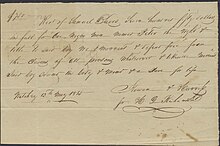
Rowan & Harris, sometimes Harris Rowan & Co., was a slave trading company of the United States, known for selling at the Forks of the Road slave market in Natchez, Mississippi in the 1830s. The principals were John L. Harris and Thomas Rowan.
In 1834, Harris was advertising "180 negroes for sale" in Natchez. Rowan died sometime before 1851 when their lawsuit against Hiram G. Runnels went before the U.S. Supreme Court. The nature of the case was "In Rowan v. Runnels, the plaintiffs, John A. Rowan [sic] and John L. Harris, brought action to recover on a promissory note given them by the defendant, Hiram G. Runnels. The note was dated March 27, 1839, and was payable March 1, 1840. The only consideration in back of the note was certain slaves brought into Mississippi in 1836 and sold by the plaintiffs as merchandise. This was the evidence presented in the lower court, and the jury was instructed to declare the note void if the slaves had been introduced into the State and sold after May 1, 1833. When the verdict and judgment were rendered against them, the plaintiffs appealed to the lower federal court where the contract was held illegal under the Mississippi Constitution of 1832, and appeal was taken to the Supreme Court..." The court overruled the Mississippi Supreme Court and declared Mississippi's 1832 rule prohibiting slave sales irrelevant to the contract, with Roger Taney writing for majority. Peter V. Daniel dissented, writing "that a state court interpretation of its own constitution should be binding on all. To ignore this rule as the Court was doing was, in his opinion, to reflect upon the competency of state courts and to impair the very nature of the federal system".
In 1841, Rice C. Ballard was the trustee listing for sale the 2,300-acre Bruinsburg plantation in Claiborne County and over 100 slaves (including 23 children under age eight) "to pay three promissory notes owed Rowan & Harris.
See also
References
- Richardson, H. (April 4, 2022). "Bill of sale for Peter sold by H. G. Richardson on behalf of Rowan & Harris to Samuel Davis". Mississippi State University.
- "Means Used to Elect Col. Bingaman". The Mississippi Free Trader. October 15, 1841. p. 2. Retrieved 2024-07-04.
- "The anti-slavery record v.1 (1835)". HathiTrust. p. 34. hdl:2027/hvd.ah3ivb. Retrieved 2024-07-12.
- "John Harris, Surviving Partner of Rowan and Harris v. Hiram Runnels". vLex. Retrieved 2024-07-04.
- Haines, Charles Grove (2023). The Role of the Supreme Court in American Government and Politics, 1835–1864. University of California Press. pp. 118–121. ISBN 978-0-520-35036-6.
- "Trustee's Sale". Mississippi Free Trader (Advertisement). April 8, 1841. p. 4. Retrieved 2024-07-04.
This United States corporation or company article is a stub. You can help Misplaced Pages by expanding it. |